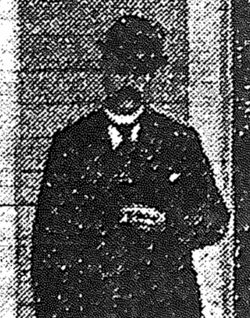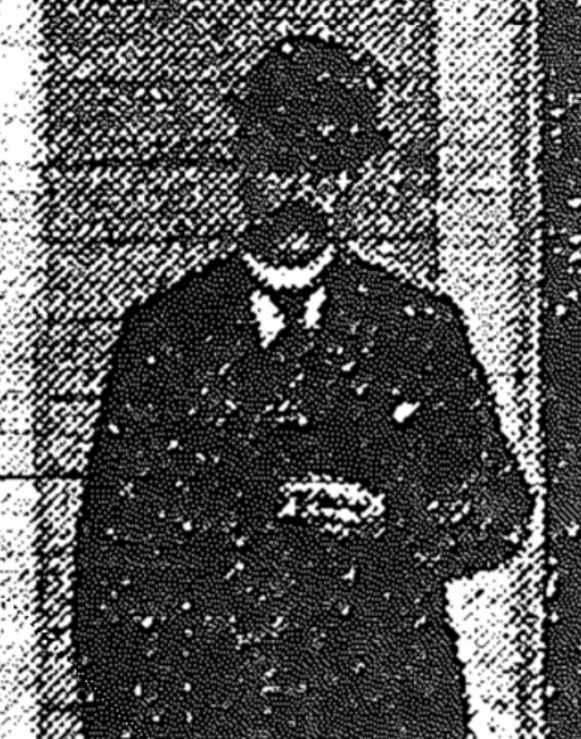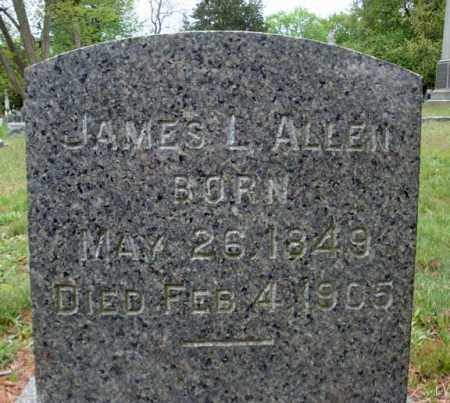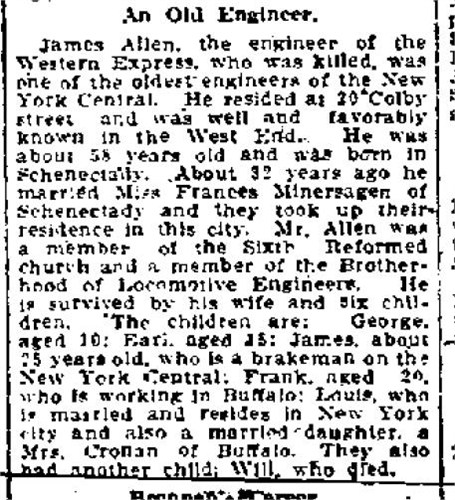In 1871, James married Frances Meinerzhagen, and they had seven children, Clara, James, Louis, William, Francis, Earl, and George Allen. The family eventually moved from Schenectady to Albany, New York sometime before 1892.
James was involved in two publicized events while working for the New York Central Railroad. In West Albany, New York on September 30, 1877, while working as a fireman on the Central railroad, James attempted to jump from one rail car to another when the train jerked, causing James to fall. He was able to hang on, but was nearly crushed by the train wheels. According to the October 6, 1877 edition of the Albany Morning Express, "Allen says that he fully realized his perilous situation - thought of his wife and two little ones, and the horrible death impending." Hanging on to the train, he saw two boys trying to jump aboard and called on them to board the train, apply a brake, and signal the train to stop. At the same time, he struck a pile of ashes and cinders lying between the tracks and was knocked off. The Albany Morning Express continues: "The force of the concussion released his grasp, and he said he closed his eyes, expecting to be killed at once. He seemed crushed almost in the earth, and opening his eyes found himself between the trucks of the car to which he had been clinging." He leaped away from the track, losing part of his boot. His coat was worn through the cloth at his right shoulder. He reported his incident to the train dispatcher and returned home, cut and bruised throughout his body.
Working as an engineer on the Western train No. 23 on February 4, 1905, while in Whitesboro, New York, James died in a boiler explosion. Reports say that James failed to make sure that there was enough water in one of the boilers, leading to the burning of crown sheets and bolts in the boiler. He was carried to a sleeping car following the explosion where he died a few minutes later. Fireman John Brennan also died, and among the 32 injured people was U.S. Representative from New York and State Supreme Court Justice Warren B. Hooker.
James was blamed in the local papers for the explosion. There was also uncertainty as to whether James took water for the boiler during a stop at Utica or not. According to the February 5 edition of the Buffalo Courier, some suggested that frozen pipes might have played a factor as well, as the temperature was -16 degrees. 600 feet of track was torn up, and an estimated property damage of $75,000. Many residents of Whitesboro were awoken by the explosion, and they believed that the local post office was being robbed. Grabbing weapons and finding nothing wrong at the post office, they returned to their homes without discovering the wreck.
James Allen was described by Conductor Theodore W. Bradley of the New York Central Railroad as a "careful, competent, good engineer, and a gentleman." Foreman Charles J. Bond echoed Bradley's statements, saying that he had known James since 1878, and "If Allen had thought there was anything wrong with the engine when he was in Utica that night, he would not have gone out with her."
In 1871, James married Frances Meinerzhagen, and they had seven children, Clara, James, Louis, William, Francis, Earl, and George Allen. The family eventually moved from Schenectady to Albany, New York sometime before 1892.
James was involved in two publicized events while working for the New York Central Railroad. In West Albany, New York on September 30, 1877, while working as a fireman on the Central railroad, James attempted to jump from one rail car to another when the train jerked, causing James to fall. He was able to hang on, but was nearly crushed by the train wheels. According to the October 6, 1877 edition of the Albany Morning Express, "Allen says that he fully realized his perilous situation - thought of his wife and two little ones, and the horrible death impending." Hanging on to the train, he saw two boys trying to jump aboard and called on them to board the train, apply a brake, and signal the train to stop. At the same time, he struck a pile of ashes and cinders lying between the tracks and was knocked off. The Albany Morning Express continues: "The force of the concussion released his grasp, and he said he closed his eyes, expecting to be killed at once. He seemed crushed almost in the earth, and opening his eyes found himself between the trucks of the car to which he had been clinging." He leaped away from the track, losing part of his boot. His coat was worn through the cloth at his right shoulder. He reported his incident to the train dispatcher and returned home, cut and bruised throughout his body.
Working as an engineer on the Western train No. 23 on February 4, 1905, while in Whitesboro, New York, James died in a boiler explosion. Reports say that James failed to make sure that there was enough water in one of the boilers, leading to the burning of crown sheets and bolts in the boiler. He was carried to a sleeping car following the explosion where he died a few minutes later. Fireman John Brennan also died, and among the 32 injured people was U.S. Representative from New York and State Supreme Court Justice Warren B. Hooker.
James was blamed in the local papers for the explosion. There was also uncertainty as to whether James took water for the boiler during a stop at Utica or not. According to the February 5 edition of the Buffalo Courier, some suggested that frozen pipes might have played a factor as well, as the temperature was -16 degrees. 600 feet of track was torn up, and an estimated property damage of $75,000. Many residents of Whitesboro were awoken by the explosion, and they believed that the local post office was being robbed. Grabbing weapons and finding nothing wrong at the post office, they returned to their homes without discovering the wreck.
James Allen was described by Conductor Theodore W. Bradley of the New York Central Railroad as a "careful, competent, good engineer, and a gentleman." Foreman Charles J. Bond echoed Bradley's statements, saying that he had known James since 1878, and "If Allen had thought there was anything wrong with the engine when he was in Utica that night, he would not have gone out with her."
Family Members
Sponsored by Ancestry
Advertisement
Records on Ancestry
Sponsored by Ancestry
Advertisement

















